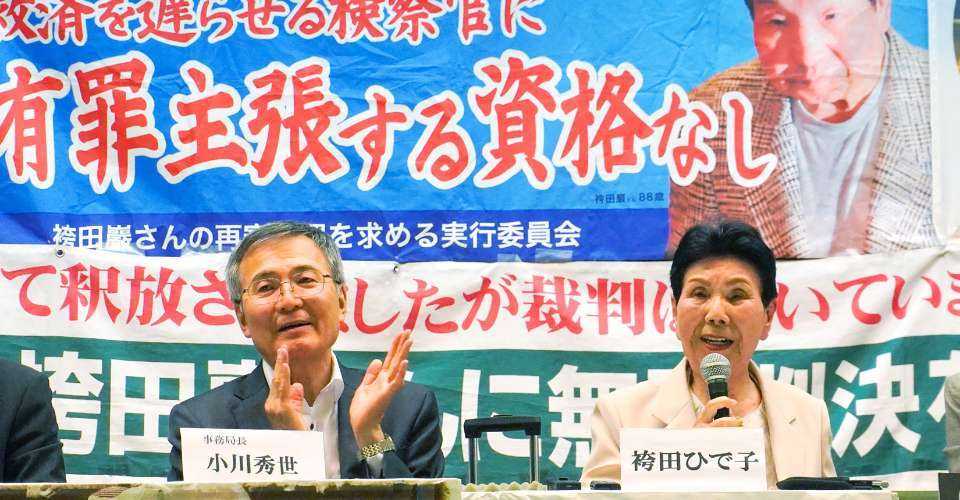
Hideko Hakamada (right), elder sister of former professional boxer Iwao Hakamada who was considered the world's longest-serving death row inmate, speaks during a press conference after her brother's retrial hearing at the Shizuoka district court in the city of Shizuoka, Shizuoka prefecture on May 22. (Photo: AFP)
Japanese prosecutors again sought the death penalty in the retrial on May 22 of an ex-boxer who was the world's longest-serving death row prisoner until his release in 2014.
Iwao Hakamada, now 88, spent 46 years on death row -- a stretch recognized by the Guinness World Records -- after being convicted in 1968 of murdering a family.
He was freed in 2014 and a retrial was ordered after a court said investigators could have planted evidence, sparking relief among his supporters who included other boxers and the rights group Amnesty International.
However, prosecutors argued at the retrial in Shizuoka, south of Tokyo, that Hakamada's guilt could be proven "beyond reasonable doubt," the Asahi Shimbun daily said.
Defense lawyers are seeking an acquittal for Hakamada, whose case has become a famous saga in Japan.
"I believe Iwao is innocent," his sister Hideko Hakamada, 91, said on May 22.
Prosecutors are only seeking the death penalty "as a matter of course" and "the defense team's rebuttal was so strong that I'm sure we'll be able to win," she told reporters.
The retrial began last year and the court is due to announce the verdict in late September.
Japan is the only major industrialized democracy other than the United States to retain capital punishment, which has broad public support.
Hakamada's supporters say his decades of detention, mostly in solitary confinement with the ever-present threat of execution, took a heavy toll on his mental health.
He said in a 2018 interview with AFP that he felt he was "fighting a bout every day."
Prolonged battle
Hakamada initially denied having robbed and murdered his boss, the man's wife, and their two teenage children, but then confessed, following what he later described as a brutal police interrogation that included beatings.
His attempts to retract his confession were in vain and his original verdict was confirmed by the Supreme Court in 1980.
But Hakamada continued to maintain his innocence. His sister Hideko has tirelessly pleaded for a review of the case.
A district court in Shizuoka granted a retrial in 2014 after a prolonged battle and issued a stay for Hakamada's incarceration and the death penalty.
Tokyo's High Court overturned the lower court ruling four years later.
The legal back-and-forth was not over: in 2020, the Supreme Court ruled that the High Court must reconsider its decision and the High Court ordered a retrial last year.
Hakamada's plight has attracted public sympathy, with even national lawmakers forming a special group to offer their support.
Hideko took the central role in her sickly brother's defense during the retrial.
One key piece of evidence used to convict Hakamada was a set of blood-stained clothes that emerged more than a year after the crime.
Supporters say the clothes did not fit him and the bloodstains were too vivid given the time that had elapsed.
As of December, there were 107 prisoners on death row in Japan, where the sentences are always carried out by hanging.
Inmates are often informed of their impending death at the last minute, typically in the early morning just a few hours beforehand.
Some "may be given no warning at all," Amnesty International said in a report.
Just nine percent of Japanese people were in favor of abolishing the death penalty in a 2019 government survey.


